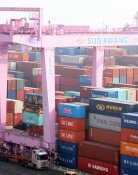Push labor to help revive economy
Push labor to help revive economy
Posted November. 09, 2012 07:57,
The ruling Saenuri Partys presidential candidate Park Geun-hye on Thursday asked the heads of Koreas five economic organizations to take social responsibility and maintain jobs, urging companies to make "concessions" to overcome the sluggish economy. Independent runner Ahn Cheol-soo also held a meeting with leaders of the Federation of Korean Industries the same day, urging them to stop relocating production facilities abroad and create jobs in Korea. He also proposed that they resolve issues involving temporary workers and protect small private businesses.
As the two candidates are championing economic democratization, it is laudable to hold dialogue with the business community, the main target of their economic reform drives. But appealing to the sense of patriotism will produce limited results that will not last long. The two presidential aspirants should learn why large corporations do not or cannot invest in Korea and how overseas investment conditions are better than those here before trying to unravel the complicated problem.
If Park and Ahn seek cooperation from corporate Korea, they should also strive for the same from unions to stimulate job creation properly. The practice of unions pursuing their vested interests is why companies are increasingly hiring irregular workers and offering fewer jobs to newly minted university graduates. In short, labor flexibility is a must for the protection and further creation of jobs. Doing this requires a grand compromise between labor and management. Presidential candidates should thus do more to get cooperation from both labor and business.
Germany last year saw its lowest unemployment rate in 20 years thanks to Chancellor Angela Merkel`s efforts to secure cooperation among labor, business and the government under a plan in which workers will reduce work hours as much as companies refrain from laying off employees. The German government, in turn, subsidized wages. When German companies were relocating to Eastern Europe in search of lower wages in the early 2000s, unions protected domestic jobs through voluntary sacrifice of working more for less, helping Germany be reborn as the engine of Europes economic growth.
In Korea, Moon Jae-in, the presidential candidate of the main opposition Democratic United Party, on Thursday announced a set of policy proposals centering on increasing jobs in the public sector. He pledged not to leave job creation entirely up to the market. Moon proposed to make 150,000 temporary workers in education permanent and allot 50 trillion won (45.8 billion U.S. dollars) worth of state-financed projects to companies that create many jobs. Creating public sector jobs that need support from tax money is not right. A heavier burden on taxpayers will make the economy worse off and ultimately make quality jobs disappear.
The Korea Association of Service Industries urged the next president to promote the services industry to create more quality jobs, saying, At a time when manufacturing-centered exports are having difficulty amid a global economic slump, there is no other way but to nurture the services industry to create jobs. None of the three major presidential candidates has yet to talk about deregulation, market principles and a social atmosphere for a business-friendly environment and a investment-worthy country, and this makes their job creation slogans sound empty.







